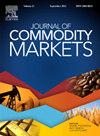在2019冠状病毒病和俄罗斯-乌克兰冲突期间测试油价预测修正的效率
IF 4.5
4区 经济学
Q1 BUSINESS, FINANCE
引用次数: 0
摘要
我们使用Consensus Economics®的Energy &; Metals Consensus Forecasts™的专有微观数据,研究了布伦特原油和西德克萨斯中质油价格固定事件预测修正中的弱形式和强形式效率。我们的研究结果表明,预测者大多独立于过去的修正,表明效率较低。我们编制了75个公开变量的数据,这些变量包括COVID-19、俄罗斯-乌克兰冲突、宏观经济、金融和石油市场指标。为了确保预报员获得的信息与他们预测时的实际情况相匹配,我们对变量进行了滞后处理,以解释出版延迟。此外,我们为每个变量添加了另一个延迟,将信息集从75个增加到150个。这在理解原油预测者可获得的信息方面作出了重大努力。采用创新的多重测试和惩罚回归方法来解决数据丰富环境中的变量选择问题,我们发现,在通过弱效率的条件下,对强形式效率的支持是有限的。值得注意的是,分析师在其修订中纳入了过去的变量值,包括COVID-19和俄罗斯-乌克兰冲突指标。我们的计量经济模型揭示了分析师的决策如何适应不断变化的市场条件、社会政治发展和关键信息。本文章由计算机程序翻译,如有差异,请以英文原文为准。
Testing the efficiency of oil price forecast revisions in times of COVID-19 and the Russia–Ukraine conflict
We investigate weak- and strong-form efficiency in fixed-event forecast revisions for Brent and WTI prices using proprietary microdata from Energy & Metals Consensus Forecasts™ by Consensus Economics®. Our findings indicate forecasters mostly revise independently of past revisions, suggesting weak efficiency. Contributing to the strong-form efficiency literature, we compile data on 75 publicly available variables, which capture COVID-19, the Russia–Ukraine conflict, macroeconomic, financial, and oil market indicators. To ensure the information available to forecasters matched what was realistic at the time of their predictions, we lagged the variables to account for publication delays. Additionally, we added another lag to each variable, doubling the information set from 75 to 150 variables. This constitutes a significant effort in comprehending the information accessible to crude oil forecasters. Employing innovative multiple testing and penalised regression methods to address variable selection in a data-rich environment, we find that, conditional on passing weak efficiency, support for strong-form efficiency is limited. Notably, analysts incorporate past variable values, including COVID-19 and Russia–Ukraine conflict metrics, in their revisions. Our econometric modelling sheds light on how analysts’ decision-making adapt to changing market conditions, sociopolitical developments, and critical information.
求助全文
通过发布文献求助,成功后即可免费获取论文全文。
去求助
来源期刊

Journal of Commodity Markets
Multiple-
CiteScore
5.70
自引率
2.40%
发文量
53
期刊介绍:
The purpose of the journal is also to stimulate international dialog among academics, industry participants, traders, investors, and policymakers with mutual interests in commodity markets. The mandate for the journal is to present ongoing work within commodity economics and finance. Topics can be related to financialization of commodity markets; pricing, hedging, and risk analysis of commodity derivatives; risk premia in commodity markets; real option analysis for commodity project investment and production; portfolio allocation including commodities; forecasting in commodity markets; corporate finance for commodity-exposed corporations; econometric/statistical analysis of commodity markets; organization of commodity markets; regulation of commodity markets; local and global commodity trading; and commodity supply chains. Commodity markets in this context are energy markets (including renewables), metal markets, mineral markets, agricultural markets, livestock and fish markets, markets for weather derivatives, emission markets, shipping markets, water, and related markets. This interdisciplinary and trans-disciplinary journal will cover all commodity markets and is thus relevant for a broad audience. Commodity markets are not only of academic interest but also highly relevant for many practitioners, including asset managers, industrial managers, investment bankers, risk managers, and also policymakers in governments, central banks, and supranational institutions.
 求助内容:
求助内容: 应助结果提醒方式:
应助结果提醒方式:


